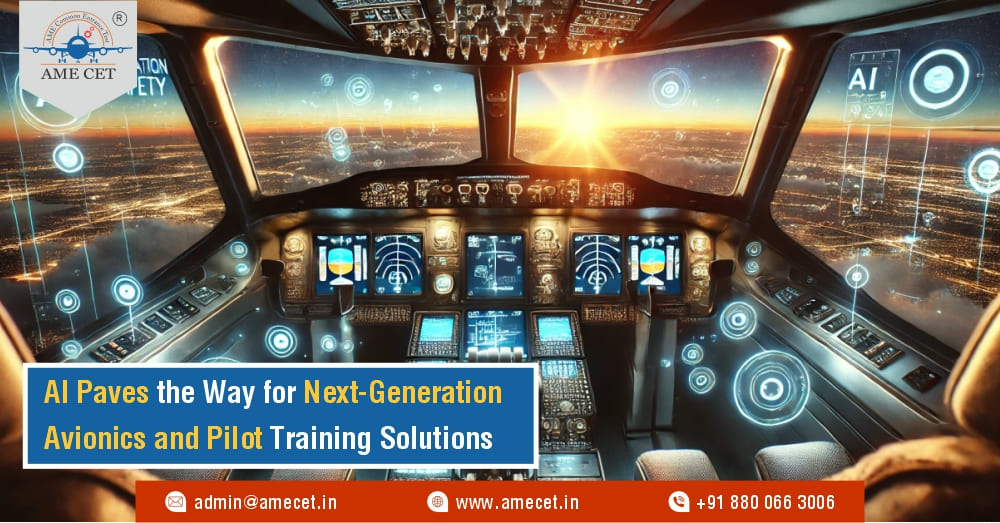
As artificial intelligence (AI) continues to make strides across industries, the aviation sector is experiencing a transformative shift. With AI’s growing influence, the development of advanced avionics systems and pilot training tools is reaching new heights. These innovations promise to enhance flight safety, improve training efficiency, and optimize aircraft performance in ways that were once thought impossible.
AI’s Role in Modern Avionics
Avionics, the electronic systems used in aircraft to monitor and control flight instruments, navigation, communication, and other crucial systems, is one of the primary areas where AI is making a significant impact. Traditionally, avionics systems have been designed to help pilots perform essential tasks, but the next wave of AI-powered avionics goes beyond simple automation to enhance real-time decision-making, predictive maintenance, and even autonomous flight capabilities.
AI technologies, such as machine learning (ML) and deep learning, are enabling avionics systems to "learn" from vast amounts of flight data, improving their ability to detect anomalies and predict potential failures before they occur. For example, AI algorithms can analyze sensor data from multiple systems on the aircraft, identifying patterns that may indicate mechanical wear, fuel inefficiency, or other factors that could affect flight performance. By processing this data in real-time, these systems provide predictive alerts to pilots and ground crews, allowing them to take corrective action long before a problem escalates.
In addition to predictive maintenance, AI-powered avionics are also helping to optimize flight paths and fuel consumption. Machine learning algorithms can process vast amounts of weather data, air traffic information, and historical flight data to suggest the most efficient flight routes, reducing fuel consumption and cutting costs. AI can also assist in optimizing aircraft operations, from engine performance to weight distribution, ensuring maximum efficiency during flight.
One of the most exciting areas of AI innovation is in the development of fully autonomous aircraft. Although the idea of pilotless commercial flights is still in the early stages, AI is playing a crucial role in testing autonomous systems that can operate aircraft with little to no human intervention. By utilizing advanced sensors, real-time data analysis, and machine learning, AI can enable aircraft to navigate complex airspace, adjust to changing weather conditions, and make real-time decisions in the absence of human input.
AI Transforms Pilot Training
Beyond avionics, AI is also revolutionizing pilot training by providing more personalized, efficient, and cost-effective methods for flight education. Historically, pilot training has been a highly structured and expensive process, relying heavily on flight simulators, classroom instruction, and in-flight experience. However, AI-driven solutions are making it possible to simulate even more realistic and varied scenarios, improving the quality of training while reducing costs.
AI-powered flight simulators are becoming more sophisticated, using real-world data and machine learning to create dynamic training environments. These simulators can replicate a wide range of conditions, from unexpected weather events to complex emergency scenarios, providing pilots with the experience they need to handle high-pressure situations. Additionally, AI can track a pilot’s performance in real-time, offering personalized feedback and suggestions for improvement based on their specific strengths and weaknesses.
One of the most promising advancements in AI for pilot training is the integration of virtual assistants and interactive training modules. AI-driven virtual instructors can help pilots practice specific maneuvers or respond to emergency situations by providing real-time guidance and decision-making advice. This creates a more adaptive and flexible training environment, allowing trainees to receive hands-on experience without the limitations of a physical classroom or expensive simulator time.
Moreover, AI is also helping to streamline the process of certifying pilots and ensuring ongoing proficiency. Through continuous data collection and analysis, AI can monitor a pilot’s performance during training and even on operational flights, providing valuable insights into areas that may need improvement. This ongoing assessment helps airlines and training organizations ensure that pilots maintain the highest safety standards throughout their careers.
The Future of AI in Aviation
As AI technology continues to evolve, the potential applications within aviation are vast. From enhancing the safety and efficiency of flight operations to revolutionizing the way pilots are trained, AI is poised to play a pivotal role in shaping the future of air travel.
While the full integration of AI in aviation may still be years away, the industry is already seeing the benefits of these innovations. With AI-powered avionics systems and intelligent pilot training tools, aviation is entering a new era where both safety and efficiency are significantly improved. The next generation of aircraft, both piloted and autonomous, will rely on AI to ensure that air travel remains safe, cost-effective, and sustainable for the years to come.
Category
-
Aircraft Maintenance Engineering (DGCA) (62)
-
(268)
-
Cabin Crew (1)
-
Aerospace Engineering (3)
-
Aeronautical Engineering (2)
-
Airport Management (5)
-
Aircraft Maintenance Engineering (EASA) (6)
-
Airport Ground Staff (1)
-
Commercial Pilot License(CPL) (51)
-
Aircraft Maintenance Engineering (BTech/BE) (1)
-
B.Sc. in Aviation (1)
-
AME CET (5)
